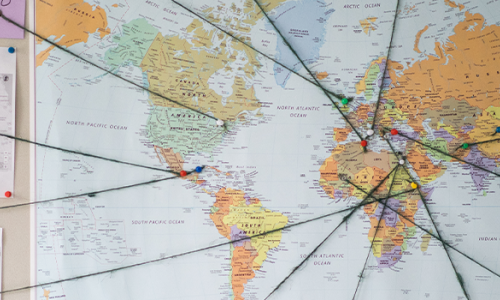
Geography (HBSc)
The Geography BSc offers a broad perspective on physical geography. In-depth studies include climatology, hydrology and ecosystems, with possible specialization in biogeochemistry, arctic regions, landscape ecology, natural resources and urban climate. The curriculum stresses the integrative nature of the discipline as well as the development of skills in geographical information analysis.
Our department prides itself in being at the forefront of student experience at UTM. Our faculty are very successful and active researchers, maintaining research programs, laboratories and supervise graduate students at UTM. They are also outstanding teachers, with several of our faculty being recognized with teaching awards from both inside and outside the university.
Program Plans
Plan your degree with these academic and co-curricular program overviews.
Tip Sheets
Learn more about further education, applying to jobs & more!
- Medical Geographer
- Survey Tech
- Meteorologist
- Climatologist
- Wildlife Technician
Admission Requirements
Regional Requirements
Admissions RequirementsLife in Geography (HBSc)
Buzz Around Campus
Sample Courses
This course will teach students how to use remote sensing data to monitor environmental changes.
This course will cover foundational concepts in mapmaking by using geographical information systems.
This course will examine the properties of snow, glaciers, ice, and runoff, and the changes in Canada’s cryosphere.
Student Groups & Societies
Other Programs to Consider

GeoSpatial Data Science
The GeoSpatial Data Science BSc offers an analytical perspective on geographical information. What you learn in the GeoSpatial Data Science program is applicable to employment in public and private sectors including public health and healthcare, urban transportation planning, natural resource management, and conservation agencies. In-depth studies — beyond basic geography — include mapping, spatial analysis, digital databases with specializations in modelling, statistical analysis and remote sensing.

Environmental Science
Environmental Science is an interdisciplinary study of complex environmental problems involving the natural world and human impacts. Students can tailor the scientific focus of the program to their own interests, by choosing courses from Geographical and Earth Science perspectives; Biological/Ecological perspectives; and Physical/Chemical perspectives. Courses on Social and Policy perspectives are also part of the program; no matter which pathway is followed, some courses on Social and Policy Perspectives are required.

Combined HBSc Environmental Science/MSc Sustainability Management
Students in either the Specialist or Major program in Environmental Science with an interest in pursuing a Master of Science in Sustainability Management (MScSM) (offered at the UTM campus) have the opportunity to participate in a Combined Degree Program. Combined Degree Programs in Environmental Management and MScSM will allow students to complete an undergraduate degree with an early admission offer to the MScSM program in their fourth year of study.



